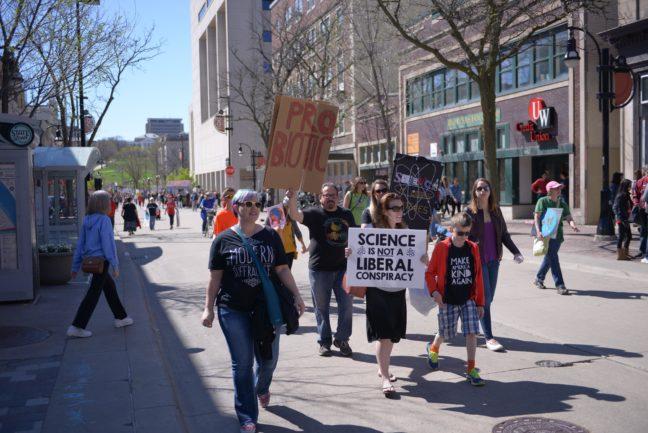Samiha Bhushan ([email protected]) is a freshman studying neurobiology and English literature.
A recent study from Pew Research Center found American public trust in scientists is on the rise. This year, 86% of adults report having either a great deal or a fair amount of trust in scientists, compared to 76% in 2016.
But the study also revealed a strong partisan divide. Of American Democrats, 43% reported having a “great deal” of confidence in scientists, compared to only 27% of Republicans.
This highlights an issue which not enough people think about: the growing politicization of science.
Issues such as climate change are considered controversial — just 56% of Americans believe protecting the environment should be a priority for the President and Congress. But more than 97% of scientists studying climate change agree that human activities are responsible for the alarming trend.
Science politicization, funding fights leave researchers in limbo
This huge discrepancy between scientific consensus and public opinion is a product of how science is treated in the political sphere. The pursuit of science is at the mercy of the whims of political figures including legislators and the government itself.
In a perfect world, science and politics would be two very different things with no relation to one another. In reality, the fact remains science and politics go hand-in-hand, from government funding of scientific research to politicians’ portrayal of various scientific issues.
People rarely consider the impact the elections have on scientific funding, but the government controls the vast majority of the science we see produced today. From the beginning of his term, President Donald Trump has targeted scientific research by proposing large cuts to U.S. spending on scientific progress. He has proposed a 13% cut in the National Institutes of Health’s budget and a 12% cut in National Science Foundation. This pairs with a steep increase in military expenditure.
Trump’s proposed plan would severely limit America’s advancement in science and worse — leave the U.S. vulnerable to public health crises. As federal programs’ budgets are ruthlessly cut, one of which includes the Epidemiology and Laboratory Program, whose already modest budget is dedicated to preventing outbreaks along the lines of Ebola and the Zika virus.
Trump’s budget cuts reflect the attitudes of Republicans, as they inflate the importance of military spending and consider scientific research optional. From the way Americans perceive science, it is clear Republican rhetoric affects the American public.
Public trust in science is a reflection of public trust in leaders — both political and scientific.
In 2016, Trump hired known climate change denier Scott Pruitt to be the head of the Environmental Protection Agency. Following numerous queries into his actions as leader of the EPA, including the likes of traveling first class on planes and soundproofing his office, Pruitt resigned less than two years later. During this time, Pruitt lost the respect of many EPA agents, and the highly publicized scrutiny Pruitt was put under further placed Trump’s judgment of scientific appointees into question.
The entire Pruitt fiasco begs the question: how can we report “a great deal of confidence” in science when the figureheads themselves — the President and previous head of the EPA — reported believing “global warming was created by and for the Chinese?” The anti-science conspiracy theories do not end there, as the anti-vaxxer movement grows.
Finding hope in panic: Youth turn to desperation to save the Earth
Fortunately, anti-science attitudes are generally not reflected under Gov. Tony Evers in Wisconsin. On Nov. 19th, Evers signed bills to make vaccines more accessible. His plans include supporting Wisconsin’s pledge to support the Paris Climate Change Accords.
Similarly, the University of Wisconsin has aimed to mitigate climate change by signing the Resilience Agreement, which will address climate change in collaboration with Second Nature, a nonprofit attempting to reduce UW’s carbon footprint.
UW’s aim to reduce the effects of climate change are in direct conflict with the Republican agenda. If Evers is a reflection of how Democrats treat science, then Democrats must be voted in for legislative and presidential positions to advance scientific development.
This means those who want scientific progress to be a focus of federal and state governments — and those who care about public trust of science — must seriously consider Democratic leaders for future elections, including the upcoming 2020 election.





















